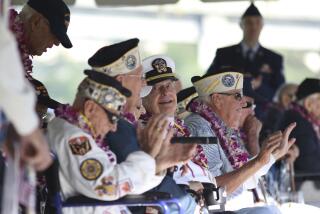Julio âJayâ Ereneta, 103; One of the Stateâs Last World War I Veterans
Julio âJayâ Ereneta, one of Californiaâs last surviving veterans of World War I who also served in World War II, has died at the age of 103.
Ereneta died April 15 in San Diego of congestive heart failure, his son Frank said.
Articulate and mentally sharp until the end of his life, Ereneta was in popular demand for Veterans Day and other military ceremonies. He particularly enjoyed encouraging young sailors and Marines at reenlistment ceremonies. To them, Ereneta was a walking history of the Navy.
Born Jan. 2, 1902, in Iloilo City in the Visayan Islands of the Philippines, Ereneta began his seagoing career at age 17 when he signed on as cabin boy aboard the Danish ship Selandia for a trip to New York via the Panama Canal.
He joined the U.S. Navy on Feb. 18, 1919. Although World War I had ended on Armistice Day, Nov. 11, 1918, Ereneta qualified as a veteran of that war by serving aboard the U.S. minesweeper Eider, which cleared mines from the North Sea after the Armistice.
The Germans had laid down the greatest concentration of sea mines in maritime history -- more than 70,000 mines from the coast of Scotland to Norway. In clearing them, the American and British navies sustained several casualties.
In March, retired Air Force Lt. Col. Robert W. Johnson, adjutant of the Department of California Veterans of World War I of the USA, recognized Ereneta as a bona-fide veteran by presenting him with the World War I Commemorative Medal.
At the ceremony, Johnson said Ereneta may have been Californiaâs last surviving veteran of the so-called war to end all wars.
Ereneta joined the U.S. Navy decades before it integrated and as a Filipino was given posts as a mess attendant or steward. He quickly made breakthroughs, rising during his 30-year Navy career to radio operator, combat air crewman, aviation chief petty officer, chief warrant officer and naval flight officer.
After his minesweeping stint, Ereneta served aboard the wooden ship Hartford, which had been Admiral David Farragutâs flagship during the Battle of Mobile Bay in 1864. The sailor also was stationed on the battleship Florida.
In 1920 and 1921, Ereneta attended radio school at the Navyâs Great Lakes training center near Chicago.
Qualified as an aviation radioman, Ereneta made his first air crewman flight in a seaplane assigned to the aircraft tender Wright in 1922.
During the 1920s and 1930s, he was rear-seat radioman and gunner in tactical air squadrons of the Navyâs first aircraft carriers, the Langley and Lexington, and in catapult-launched scout planes from the cruisers Trenton and Savannah.
He also served in flight operations at Naval Air Station, North Island in San Diego before and after World War II. In January 1941, trading duty with a fellow aviation radioman who needed the flight hours, Ereneta evaded death when the transport plane he had been assigned to crashed.
The crash at Mother Grundy Peak near Lake Barrett in San Diego County killed all 11 Navy crewmen aboard.
When World War II erupted, Ereneta was assigned to aircraft carriers as a chief warrant officer in the Solomon Islands, including Guadalcanal. He also participated in the liberation and occupation of his native Philippines.
After retiring from the Navy on May 1, 1949, Ereneta worked as an electronics assembler and technician for Convair Aircraft and later Convair General Dynamics. There he supervised a factory electronics calibration laboratory for guidance systems of the early Atlas missiles and Mercury and Gemini spacecraft.
In his off-duty hours, Ereneta was an amateur radio operator who, before Internet and satellite weather forecasting technology was available, relayed warnings of bad weather to mariners and fishermen in remote areas of Mexico and elsewhere.
Ereneta is survived by his wife, Rose; two sons, Frank and Michael of San Diego; two daughters, Roselyn Ereneta of Las Vegas and Julie Ereneta Kane of San Diego; eight grandchildren, and nine great-grandchildren.
The family has asked that any memorial donations be made to the Navy-Marine Corps Relief Society.
More to Read
Sign up for Essential California
The most important California stories and recommendations in your inbox every morning.
You may occasionally receive promotional content from the Los Angeles Times.









